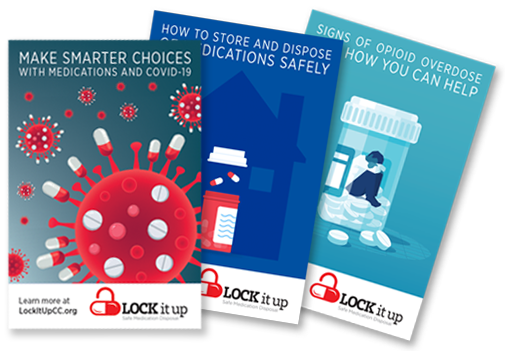All prescription and many over-the-counter medications can be extremely dangerous to your family when misused. Be sure to secure your medications in a consistent manner that ensures access by only you and/or responsible individuals.
- Pick a location in your home that is above and out of light of children and visitors. Use a locking medicine cabinet or install a lock on the location.
- Return medication to this secure location after every use. Do not leave medication containers on countertops, nightstands, or places in open view of others.
- Do not keep loose pills in easily opened bags or containers in your purse or cabinet drawers. Keep single dosages of prescriptions in locking travel cases if necessary.
If you have any unused or expired prescriptions, promptly get rid of them—do not keep them around for later use “just in case.”
- Take these medications to designated drop box locations around Charles County.
- Participate in drug take-back events and programs overseen by the County.
- DO NOT flush medications down the toilet or pour then down the drain—this can pollute water supplies and is also illegal in many areas.
- If you cannot reach a drop box location or drug take-back event, mix the medication with an unappealing substance such as dirt, cat litter, or coffee grounds, and place the mixture in a sealed plastic bag. Place the sealed bag directly in your trash can and cover with additional trash items.
Be sure to read the labels of all medications before you use them. You can find important information not only on dosage amounts but also:
- Recommendations for safe storage.
- Who should and who shouldn’t be taking the medication.
- What to do if adverse side effects occur.
- Contact information for the pharmaceutical company if you have questions about the medication.
It’s no secret that opioid misuse has been one of the most dangerous threats to public health in recent years. In many cases, opioids and other prescription painkillers have become a stepping stone to heroin addiction, overdoses, and deaths. You can learn more about the potential dangers of opioids here.
In the meantime, help prevent the unintended discovery and usage of these medications in your home by following the recommendations outlined on this site.
By itself, COVID-19 a serious threat to your health. But if you have a substance use disorder, COVID-19 can increase the risk even more. Substance misuse from illicit or unauthorized access to prescription drugs or opioids, in combination with COVID-19 can lead to:
- Breathing difficulties and/or lung damage
- Stroke and/or seizures
- Heart attacks
- Brain damage
- Death
For more information about COVID-19 and its effects on substance use, please visit: https://www.drugabuse.gov/drug-topics/comorbidity/covid-19-substance-use and https://www.cdc.gov/drugoverdose/resources/covid-drugs





